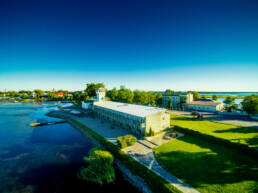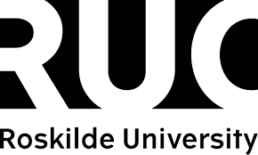Designing Human Technologies 11.0
Call for participation in the 11th edition of the doctoral course on designing human technologies
About
The 11th edition of the doctoral course takes place from 7 to 9 May 2025 in Haapsalu, Estonia. The three-day course is organised by Tallinn University in collaboration with Roskilde University, University of Trento, Reykjavik University, and Carleton University. DHT 11.0 is the 11th doctoral summer school course offered to doctoral students working with or interested in Participatory Design, that is, doctoral projects conducted in close collaboration with users, citizens, or other external stakeholders. The course requirements (accepted position paper and participation) is equivalent to 3 ECTS.
Topic
Designing Human Technologies is a broad Participatory Design-oriented research approach with a central human principle of participation and ethical concerns. Common goals of research activities in this field include being constructive and solution-oriented in close dialogue with citizens and users. Deep analysis of how designs are used and enter the daily lives of their users, as well as innovative design solutions, are the core of this course. The human principle includes involving users and main interest groups in the design and evaluation of the ability of design artefacts to meet the goals. Technology is understood broadly, including information and communication technologies, process technologies, sustainable environmental technologies, energy technologies, and technologies for design in urban, nature, or other spatial settings.
Purpose & format
We meet to discuss our experiences in relation to doctoral work in the rich and diverse field of designing human technologies. The course is a blend of lectures and discussions in small groups. Invited lectures by senior academic staff present key theories, methodological reflections and novel approaches within the field. Discussions will take place in groups of five doctoral students and two faculty members, discussing the position papers of the students. Group discussions will dedicate one hour to each position paper, divided into (max) 10 minutes of informal presentation and 50 minutes of discussion. Students will present each other’s papers, not their own papers. In addition, the course provides opportunities for networking with other doctoral students and senior faculty in the field of designing human technologies, thereby enriching relations among those who also attended last year’s editions and providing an entry point for those who did not.
Schedule
| Wednesday, May 7 | Thursday, May 8 | Friday, May 9 |
| Until 9:00 Breakfast |
Until 9:00 Breakfast |
|
| 9:00 – 11:00 Talk will be announced later |
9:00 – 11:00 Talk will be announced later |
|
| 10:00 – 11:00 Group discussions (session 1) |
10:00 – 11:00 Group discussions (session 5) |
|
| 11:00 Pick-up from Tallinn University |
11:00 – 12:00 Group discussions (session 2) |
11:00 – 12:00 Group discussions (session 6) |
| 12:00 – 13:00 Talk will be announced later |
12:00 – 13:00 Pop-up contributions, summing-up, evaluation, reflection |
|
| 13:00 – 14:00 Welcome and lunch |
13:00 – 14:00 Lunch |
13:00 – 14:00 Lunch and departure |
| 14:00 – 15:00 Talk will be announced later |
14:00 – 15:00 Talk will be announced later |
16:00 Drop-off at Tallinn University |
| 15:00 – 17:00 Talk & Workshop will be announced later |
15:00 – 16:00 Group discussions (session 3) |
|
| 16:00 – 17:00 Group discussions (session 4) |
||
| 17:00 – 18:00 Free time |
17:00 – 18:00 Free time |
|
| From 18:00 Dinner |
From 18:00 Dinner |
Venue
DHT 11.0 will take place in Haapsalu, Estonia. The venue is the Promenade Hotel. This simple but picturesque seaside hotel offers spacious and sunlight-filled seminar rooms, providing a lovely atmosphere for fruitful discussions. Shared rooms, meals and transportation from and to the capital, Tallinn, will be provided by Tallinn University.
Guest lecturers
We invite faculty with proven expertise and a solid research track in interaction design, community centred design, values centred design, user centred design and user studies, to join this edition of the course as a guest lecturer. Should you be interested, please let us know before March 3rd.
Call for participation
Application deadline: 3 March 2025
Applications are to be submitted online. The application form consists of your contact data, a short description of your research topic and a short explanation of your motivation for participating in the course.
Notification of admission: 17 March 2025
Notifications are sent by email and, if accepted, you’ll be given the full programme and further instructions. 20 doctoral students will be admitted to the course.
Position paper submission deadline: 7 April 2025
All participants are expected to submit a position paper (up to 6 pages) using a template for the course based on the ACM SIGCHI Extended Abstract format. The position paper must elaborate on research questions, methodological reflections, theories, and their relation to participatory design, as well as a selection of achieved and/or expected outcomes. Detailed instructions and a notification will be sent to all admitted students.
Fee for participation
Registration, accommodation, and meals during the doctoral course are covered. Participants must arrange and pay for their own travel to Tallinn, Estonia.
Organizers
Faculty
Merja Bauters, Tallinn University
Vincenzo D’Andrea, University of Trento
Chiara Del Gaudio, Carleton University
Mika Jasuoka Jensen, Roskilde University
David Lamas, Tallinn University
Marta Kristín Lárusdóttir, Reykjavik University
Jesper Simonsen, Roskilde University
Sonia Sousa, Tallinn University
Vladimir Tomberg, Tallinn University
Local organizers
David Lamas, Tallinn University
Maria Saar, Tallinn University
Contacts
For further enquiries contact maria.saar@tlu.ee
Previous editions
DHT 10.0 – 2024, Trento, Italy
DHT 9.0 – 2023, Trento, Italy
DHT 8.0 – 2022, Ristna Sadam, Estonia
DHT 7.0 – 2019, Virelaid, Estonia
DHT 6.0 – 2018, Trento, Italy
DHT 5.0 – 2017, Pärnu, Estonia
DHT 4.0 – 2016, Roskilde, Denmark
DHT 3.0 – 2015, Roskilde, Denmark
DHT 2.0 – 2014, Roskilde, Denmark
DHT 1.0 – 2013, Roskilde, Denmark










